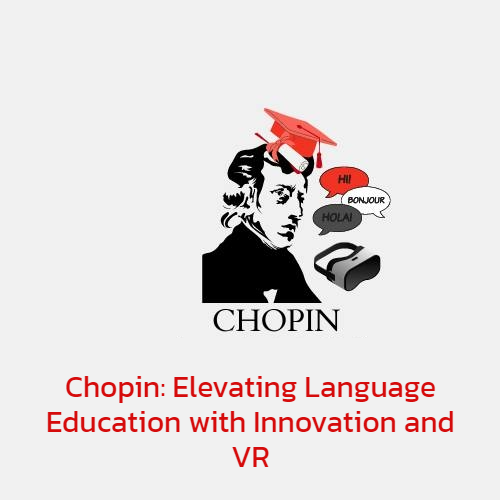‘CHOPIN – language learning in sCHools: Preferably Immersive and billiNgual, abbreviated as CHOPIN;
The project is implemented under the Erasmus+ programme within the School Education – Small Scale Partnerships action KA210-SCH.
Project duration: 15 months.
Project implementation period: 01.10.2022. – 01.01.2024 r.
Project identification number: 2022-1-PL01-KA210-SCH-000083282
Project objective
The main objective of the ‘CHOPIN’ project is to develop teachers’ skills in language teaching and the use of virtual reality (VR). But that is not all! The initiative also aims to:
- Introduce VR into teacher training. The project seeks to integrate modern VR technology into teacher training, enabling teachers to better adapt to the needs of today’s students.
- Changing teaching methodologies. Through the use of activating working methods such as VR, the CHOPIN project aims to diversify language teaching methodologies and make them more accessible and interesting for students.
- Developing Higher Order Thinking Skills (HOTS). Using lower-order thinking strategies (LOTS), the project aims to develop students’ higher-order thinking skills such as analysis, synthesis and critical thinking.
Introduction: Digital pedagogy and language learning are not adversaries; they are intertwined, much like siblings. The CHOPIN project seeks to revolutionize bilingual education in schools by introducing innovative approaches, blending Content and Language Integrated Learning (CLIL) methodology with a bespoke Virtual Reality (VR) solution. This initiative aligns with the curriculum of partner countries and focuses on enhancing the practical training of in-service school teachers in the European Union.
Objectives:
Objective I: Promoting Professional, Personal, and Digital Skills
- Develop a learning scenario that addresses real classroom needs, making implementation straightforward.
- Promote personal and digital skills among teachers by integrating digitally-supported teaching and learning methods.
- Utilize new technologies to enhance the appeal of teaching professions.
The CHOPIN Approach:
- Establish a digital platform as a common framework for teacher induction, fostering a learning community based on reflective practice.
- Redefine and develop a Trans-European CLIL methodology.
- Create real-based study cases to enhance practical teaching skills.
- Design, develop, and manage a peer-social network to address teachers’ daily challenges.
- Integrate and enhance a European digital platform to support and improve CLIL teacher practices.
- Equip teachers using the CLIL method with the knowledge and skills to create their own materials.
- Provide high-quality, transferable CLIL-based teaching materials to teachers and students.
- Foster a community of practice where educators can share CLIL materials and teaching tips.
Objective II: Incorporating Modern Virtual Reality (VR)
- Enrich language learning through media-pedagogical VR experiences.
- Ensure that all participating teachers are proficient in both VR and CLIL methodologies.
- Combine multiple subjects within a single CLIL activity (e.g., ICT + History + English) and align with the 5C regulations: Content, Communication, Competence, Cognition, and Community, as well as Bloom’s Taxonomy.
Objective III: Developing Higher Order Thinking Skills (HOTS)
- Elevate students’ Lower Order Thinking Skills (LOTS) to HOTS, fostering critical thinking and analytical abilities.
Objective IV: Ensuring Sustainability
- Implement strategies to sustain project results even after its completion.
- Conduct sharing and promotional activities to maintain interest in project outcomes.
- Establish a project webpage and sustainability plan to achieve defined goals.
The CHOPIN project is poised to reshape the landscape of bilingual education, equipping teachers with the tools and knowledge needed for modern language learning. By seamlessly blending CLIL and VR technologies, it aims to enhance teaching quality, foster higher-order thinking skills among students, and ensure the lasting impact of its innovations. Through collaborative efforts and a commitment to pedagogical excellence, CHOPIN is set to empower both educators and learners in the European Union and beyond.
